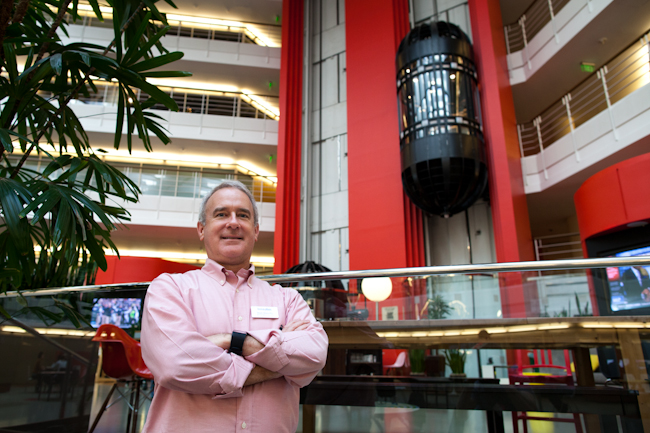Mark Gorenflo, Defense Innovation Unit operations director, U.S. defense department

Haas EMBA student Mark Gorenflo inside gaming giant Zynga in San Francisco – Ethan Baron photo
One thing about a professional network – when you move far away, you can’t take it with you. Sure, you can tap in from a distance, and much value will remain. But in many cases, starting a new life somewhere else means building a new network, or at least developing a great many new contacts on your new professional frontier.
Mark Gorenflo had left his job in The Pentagon, as a principal director for the Deputy Under Secretary of the Navy for policy, to move to San Francisco for personal reasons. “It quickly became evident that for a person at my stage in my career, getting a job is much more of function of the network you have than the resume that you have,” Gorenflo says. “It’s more important who you know.”
Gorenflo had a strong network out East, but “only tendrils of networks” in the San Francisco Bay Area. He had worked as a civilian in innovation-focused areas of the military, including in his Pentagon job. “We were looking at things like rail guns, undersea superiority, directed energy, those kinds of cutting-edge technologies that were just being thought of and developed,” he says.
WHAT TO DO IN THE NEXT HALF CENTURY
While at Haas, Gorenflo, 54, is weighing the options for his future career. “Do I want to be in the innovation/entrepreneurial space, or in a more traditional role in an established larger company, or in consulting?” he says midway through the Haas Silicon Valley Immersion Week. “Not having had exposure to the entrepreneurship/innovation ecosystem in the civilian sector, this week has been a fabulous opportunity for me to see what I like about it, see what I don’t like about it, and see whether it’s a good fit for me when I figure out what I want to do when I grow up.”
Gorenflo found the educational process behind the immersion week program highly effective. Students learned theory in the classroom during their EMBA studies – in such areas as marketing, finance, leadership, and organizational development – and Haas entrepreneurship professor Toby Stuart then drew from all those areas in his teaching of case studies during the immersion, Gorenflo says. “Then we had the opportunity to really reinforce the classroom case study discussion by going out and visiting entrepreneurs who are starting their own companies, and getting from them, ‘How do you bootstrap a company? What kind of sacrifices are required on the part of the founders? How do you negotiate growth issues?’
“(Companies) were very carefully picked so that each trek cohort got a portfolio of companies that illustrated key aspects of the things we had discussed the day before in case studies.”
During a visit to a venture capital firm on legendary VC avenue Sand Hill Road, students heard that the company liked to invest in startups where the founder could be the CEO, Gorenflo says. He asked how the VC firm could judge whether the founder had that capacity, and was told it came down to the ability to tell a compelling story of the new enterprise. “We all kind of thought that was an odd but interesting kind of quality or characteristic,” he says. But later that day, Gorenflo’s cohort visited a company with a charismatic CEO who could spin out a captivating story of his firm. “Now you knew why that venture capital firm valued that as a skill, and how important it is for an entrepreneur to get his or her vision across. You have that storytelling ability, that can be a real organizing principle for the business.”
NOT SEEING A FOUNDER IN THE MIRROR
Gorenflo doesn’t see himself in the role of startup founder or CEO, he says. “For a person at my time in life, the opportunity cost is too high and the amount of useful working life for me is too low,” he says. Gorenflo took to heart professor Toby Stuart’s description of the scale of MBA-grad happiness: successful startup founders being the most happy, those in traditional management jobs in big companies second-happiest, consultants and MBA-wielding doctors and lawyers third-happiest, and founders of stagnant startups the least happy. “They didn’t succeed, they didn’t fail, they just kind of limped along for five or 10 years,” Gorenflo says.
However, he’s interested in what he believes would be the “sweet spot” for him, in a company in later stages of VC funding that has a product, customers, and revenue, and wants to scale up. “I’ve got leadership experience, operational experience,” he says. “That’s an area where I think I could add value.”
Still, Gorenflo realizes he’s looking into a world far different from that he’s occupied for decades while working in defense, and he might not appear at first glance to be a suitable candidate for tech sector operations jobs. That’s why building a new network, and broadening and deepening it via the Haas EMBA and the Silicon Valley Immersion, is crucial, he says, “so I can uncover those opportunities . . . develop a personal relationship with folks who are here in the Valley, people willing to take a bit of a risk.”





Questions about this article? Email us or leave a comment below.